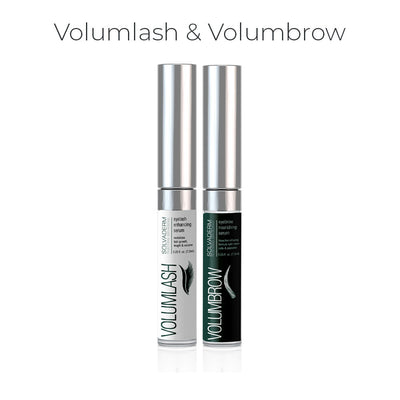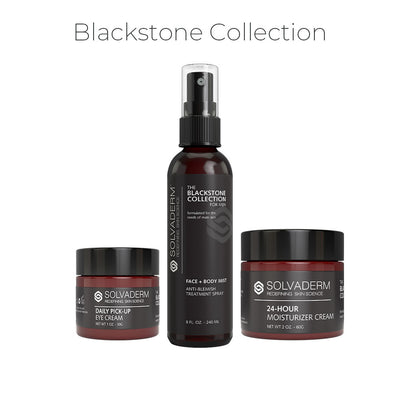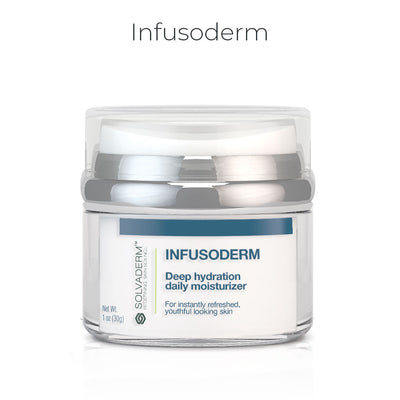Your face not only has thinner, more delicate skin than the other parts of the body but it is also exposed throughout the year to different factors that can damage it.
One effect of these factors is dry and flaking skin on the face. You've probably experienced dry skin when the weather changes and the air becomes cold, and while it is a common skin concern, it can be extremely uncomfortable, in addition to making you feel self-conscious. However, if you have dry skin and want to do something about it, you're in the right place! Read on to learn about some causes of dry skin on the face and the best way to treat it.
Factors That Cause Dry Skin On Your Face
Our skin is hydrated naturally with an oil called sebum. While excess sebum can cause pimples, the presence of sebum on your skin is important because, aside from hydrating, it also protects the skin from infections and keeps it from drying out.
One of the main reasons for dry, peeling skin on the face is a lack of sebum and this can cause different conditions like itching, redness, or patchy skin. There are, however, many other causes of flaking skin on the face, including the following:
Eczema
Eczema is a skin condition that makes your skin dry, itchy, and rough. It weakens your skin's barrier function, reducing its ability to retain moisture and shield your body from external factors. Itchiness and rashes are the first signs that you have eczema and it could indicate that you have come in contact with something that has caused your symptoms to flare up.
Diabetes
Dry skin on the face can be a clinical manifestation that occurs if you have diabetes due to the high glucose levels in the blood. It causes circulation problems where the skin cannot receive blood and necessary nutrients to keep it supple.
Diabetes can cause several skin issues that ordinarily should be harmless, but with this disease, everything, including skin problems, is a cause for alarm. Some symptoms include dehydration, itchy skin, scaling, roughness, elastosis, recurring inflammation, etc.
If you have diabetes, your dry skin can become red, sore, and cracked if not treated immediately. Because the cracks on the skin are vulnerable to germs and can become infected, it is crucial to keep your skin hydrated. Also, avoid scratching the affected area because it could create wounds that lead to ulcers and infections.
Check with a board-certified dermatologist who can identify skin problems caused by diabetes and help you manage them.
Psoriasis
Psoriasis is an inflammatory skin disease that causes red, scaly lesions on the face, elbows, knees, and scalp and may also affect the nails and joints.
It originates from a dysfunction in the immune system and can appear anywhere in the body. Itchy skin is one of the symptoms you could have in addition to skin plaques, a rash, dry, cracked skin, pitted, cracked, or crumbly nails, and painful joints. Again, try not to scratch the skin as you might rupture it, allowing bacteria to enter.
Lack Of Moisture In The Air
During the winter, your skin needs special care since the heat and cold are very drying. In fact, at low temperatures, sebum production is significantly reduced, which can create an imbalance in the secretion of oils that hydrate the skin.
The same goes for wind, humidity, and hot air; they can cause further dryness, wrinkles, blemishes, and an unpleasant ‘tightness’ to your skin. Not only that: the skin will no longer adequately protect itself from external influences such as UV rays. For this reason, you should follow a richly moisturizing skincare routine that will strengthen and protect your skin barrier.
Harsh Skincare Products
Some soaps and skincare products are formulated to remove oil from the skin and contain harsh ingredients that can cause inflammation and irritation. If you wash your face with products like this, you can lose some of the oil that makes your skin hydrated and supple, leaving it tight and dry. It’s best to avoid using products with harsh ingredients like parabens and synthetic fragrances.
Environmental Factors
Heat, wind, low humidity, and high altitude are some environmental conditions that can cause your skin to lose moisture and appear and feel uncomfortably dry. Air conditioning in the summer can exacerbate dry skin because, just like heating in winter, it reduces ambient humidity.
Poor Diet
If your face is dry and peeling, take a close look at what you eat and drink. A diet that is heavy in fat might result in skin inflammation, which can impair the skin's protective properties. Also, eating a lot of sugary foods or baked goods can alter the thickness of your skin and create irritation. Another cause of dry skin is alcohol, which can negatively impact your skin's ability to provide a barrier against external elements.
Try to eat foods rich in zinc and selenium and foods high in vitamins A, C, D, and E, which will help to prevent or treat dry skin. Increasing your intake of turmeric, green tea, and omega-3 will all benefit your skin too, and may increase its defense mechanisms, lowering water loss and boosting hydration.
Also, drink plenty of water, (two to three liters a day) and eat foods with high water content, like watermelon, strawberries, or peaches, to increase your daily fluid intake.
Smoking
Smoking accelerates your skin's natural aging process, resulting in dry skin, wrinkles, and other negative changes. Even the smoke that you don’t inhale will cause dryness and skin damage.
While you may not be able to undo the harmful effects of smoking, if you stop immediately, you can lessen its effects.
How To Treat Dry Skin On Your Face
If you still have questions like ‘why is my face so flaky’ or ‘why does my face feel rough’, here are a few easy tips that can help. They are mainly simple lifestyle adjustments that you can follow to improve the look and feel of your skin.
Moisturize
Replenishing lost moisture is critical when you have dry skin, so ensure you moisturize both morning and night. In the morning, use a moisturizing cream like Infusoderm, which absorbs instantly, hydrating your face and improving elasticity.
Use A Humidifier
Avoid areas of low humidity and try to use a humidifier at home. When the air in your home is hot and dry, it can parch your delicate skin and make itchiness and peeling worse. Add moisture to your home using a portable humidifier or one connected to your furnace.
Exfoliate Regularly
If your skin is dry or flaky, exfoliation is a must. Our Advanced Exfoliating System works well on dry skin, promoting cell turnover by assisting in the removal of dead skin cells on the skin's surface.
Use Carefully Selected Skincare Products
Choosing a skincare routine is more difficult now than ever because the beauty aisles are bursting with ‘must-haves’. However, even with so many new products on the market and beauty trends to follow, a simple skincare routine will be your best choice.
When you reduce the number of products you use and take care of your skin with a few carefully selected, efficient treatments, you may lower your susceptibility to any skin problems.
Visit Your Doctor
Your symptoms should disappear if you try our simple first-line treatments for dry skin on the face. But, if your skin becomes dry even after using mild skincare products, or it becomes cracked and infected, you may have a more serious issue and should contact your doctor for personalized advice.
How Do I Get Rid Of Dry Skin On My Cheeks?
Aside from following an effective cleansing and moisturizing skincare routine using products designed specifically for dry skin, it would help if you also avoid the factors that can cause it, making sure that you:
- Avoid spending too much time in the shower
- Spend less time outdoors in hot or cold weather
- Protect your skin from the cold by wearing warm clothing
Conclusion
This article has shown you the possible causes of dry skin, such as cold weather and lack of hydration and you can now take the necessary measures to keep your skin hydrated with our skincare tips. To find out more, check out our guide on how to prevent dry skin, and look at our full range for the best products to prevent and treat dry skin quickly and effectively.








